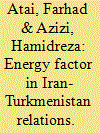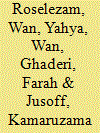|
|
|
Sort Order |
|
|
|
Items / Page
|
|
|
|
|
|
|
| Srl | Item |
| 1 |
ID:
116319


|
|
|
|
|
| Publication |
2012.
|
| Summary/Abstract |
In 1953, the United States assisted in a coup that removed Iranian Prime Minister Mohammad Mosaddeq from office. Analysis of radio broadcasts during and after the coup provides a window for scrutinizing the event and understanding the motivations of all sides. The United States monitoring agency, the Foreign Broadcast Information Service (FBIS), snatched these ephemeral broadcasts from the ether for posterity. This study expands the coup narrative based on these broadcasts. An analysis of the transcripts suggests that assertions that the Central Intelligence Agency's covert propaganda program resulted in the coup's success are an oversimplification. On the contrary, the effect of both Mosaddeq's and the Tudeh party's actions unwittingly legitimized the coup-plotters' propaganda in the weeks prior to the coup and contributed more to the success of the coup.
|
|
|
|
|
|
|
|
|
|
|
|
|
|
|
|
| 2 |
ID:
116318


|
|
|
|
|
| Publication |
2012.
|
| Summary/Abstract |
The collapse of the Soviet Union brought about major upheavals in Central Asia and the Caucasus. Among the newly independent states, those that were endowed with energy resources set out on the path of economic growth. The energy resources in Central Asia also attracted outside powers to the region. Moreover, the status of these countries as landlocked, and Russia's monopoly over energy pipelines, led these countries to search for new partners in order to reduce their dependency. This added a new dimension to the political, economic and security equations of the region. In this article, Turkmenistan is studied as a former Soviet republic and Iran as a regional actor that has interests in the region's energy dynamics. The role of energy in the relations between Turkmenistan and Iran is examined. The article proposes that the energy factor has produced a favorable atmosphere for closer relations between the two countries. However, Tehran needs to overcome a number of challenges in expansion of its relations with Turkmenistan, the most important of which is the United States' effective opposition to any Iranian initiative in the field of energy in the region.
|
|
|
|
|
|
|
|
|
|
|
|
|
|
|
|
| 3 |
ID:
116320


|
|
|
|
|
| Publication |
2012.
|
| Summary/Abstract |
Isabella Bird Bishop's Journeys in Persia and Kurdistan is presented as an objective picture of Persia, purportedly reflecting eye-witness accounts. Setting the narrative in its historical context and employing the concept of exoticism, this paper aims to unearth its subtle imperialist underpinnings. It argues that Bird's portrayal of Persian women and their mores and manners as exotic is an effect of a mode of representation which depicts and constructs difference based on a British-oriented system of evaluation, in line with its imperialist interest in Persia. As such, the exotic representation of Persian women in need of British benign tutelage and a chivalric mission could be interpreted as lending implicit support to Britain's colonial intervention in and imposition on Persia.
|
|
|
|
|
|
|
|
|
|
|
|
|
|
|
|
| 4 |
ID:
116321


|
|
|
|
|
| Publication |
2012.
|
| Summary/Abstract |
This paper critically analyzes the Sharafnama, a history of the Kurds, written by the late sixteenth century ruler of Bitlis, Seref Xan. Given the politically sensitive nature of the Middle East's "Kurdish Question," the Sharafnama has become an extremely important resource through which Kurdish nationalists have sought to construct a coherent "national narrative." This is due to the fact that Seref Xan's book constitutes one of the few systematic histories of the Kurds written before the twentieth century. This paper moves away from nationalist inspired interpretations of the Sharafnama, which see the work as a "national(ist)" history. Instead, it posits that, although the piece can be regarded as a manifestation of Kurdish "ethno-politics," it is necessary to look at it within the context of the relationship between the Kurdish tribal princes who ruled large areas of "Kurdistan," on one hand, and the Ottoman and Safavid empires who competed for control of this region, on the other. In particular, it brings to the fore an often forgotten and/or ignored aspect of Seref Xan's history, namely its pro-Ottoman bias. In this way, the article makes broader points relating to the nature of the Kurdish identity in the early modern period, and the influence of such conceptions on the later construction of the modern Kurdish identity.
|
|
|
|
|
|
|
|
|
|
|
|
|
|
|
|
| 5 |
ID:
116317


|
|
|
|
|
| Publication |
2012.
|
| Summary/Abstract |
The establishment of Jami'at al-Zahra, the first official female seminary in post-revolutionary Iran, opened new possibilities for women to enter the male-dominated clerical hierarchy. The rapid growth of female seminaries increased the presence of seminary-educated women in the official religious sphere. However, as opposed to the male seminaries whose dominant role is to train mojtaheds who can issue a competent legal opinion, the primary role of female seminaries is to train educators and propagandists. Drawing on interviews, documents issued by seminaries and secondary sources, this paper concludes that in spite of the rapid growth of female seminaries, very few women reach the rank of a mojtahed, and thus, in no way weaken the male-centric seminary system in contemporary Iran.
|
|
|
|
|
|
|
|
|
|
|
|
|
|
|
|
|
|
|
|
|